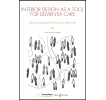Interior Design as a tool for dementia care. Experiences and guidelines for the Therapeutic Habitat Model
Synopsis
Released under the Creative Commons License Attribution-NonCommercial-NoDerivatives 4.0 International (CC BY-NC-ND 4.0) in the peer reviewed series Design International.
This book investigates the role of interior design in the enhancement of the effectiveness of Non-Pharmacological therapies for Alzheimer’s disease care.
The environment plays a main role inside the framework of Non-Pharmacological care interventions, as it can reduce behavioural disturbances, and act as a sort of “prosthesis” in the compensation of losses and cognitive deficits, especially in the last stages of Alzheimer’s disease, when the severe symptoms occurring to the person require the hospitalization. In fact, when people with dementia experience a transition from their home to a care facility, interiors play a very important role, as their sense of belonging towards the living environment is mined, causing anxiety and stress, decreased well-being and poor quality of life.
Aim of this book is to present the conceptual model for an environmental system called “Therapeutic Habitat”, meant as a system of environmental interventions, based on tangible and intangible aspects, products and furniture, objects and services – close to the logic of Design Discipline – that can enhance the well-being of people with dementia and stimulate recognition and interaction with the surrounding environment.
This model is articulated through a set of guidelines for designers, defining specific environmental intervention and strategies aimed at increasing inclusion, independence, interaction and self-confidence in people with dementia.
Downloads


